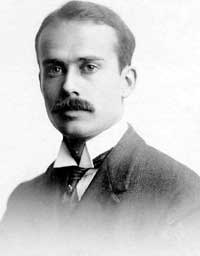Clifford Whittingham Beers
Biography of Clifford Whittingham Beers, founder of the mental hygiene movement
Clifford Whittingham Beers (March 30, 1876 – July 9, 1943) was a pioneering figure in the field of mental health and the founder of the mental hygiene movement. His work laid the foundation for modern mental health care and advocacy.
Early Life[edit | edit source]
Clifford Whittingham Beers was born in New Haven, Connecticut, in 1876. He was the youngest of five children in a family that experienced significant mental health challenges. Beers attended Yale University, where he excelled academically, graduating in 1897.
Mental Health Struggles[edit | edit source]
After graduation, Beers suffered a series of nervous breakdowns and was institutionalized in several psychiatric hospitals. His experiences in these institutions, where he witnessed and endured harsh treatment, profoundly affected him. These experiences motivated him to advocate for reform in the treatment of individuals with mental illnesses.
A Mind That Found Itself[edit | edit source]
In 1908, Beers published his autobiography, A Mind That Found Itself, which detailed his experiences in mental institutions and called for reform. The book was influential in raising public awareness about the conditions in psychiatric hospitals and the need for better treatment of patients.
Founding of the Mental Hygiene Movement[edit | edit source]
Beers' advocacy led to the establishment of the National Committee for Mental Hygiene in 1909, which later became the National Mental Health Association and is now known as Mental Health America. The organization aimed to improve the care of individuals with mental illnesses and to promote mental health education.
Legacy[edit | edit source]
Clifford Beers' work had a lasting impact on the field of mental health. His efforts helped to change public perceptions of mental illness and laid the groundwork for modern mental health advocacy and care. Beers is remembered as a pioneer who used his personal experiences to drive systemic change.
Related pages[edit | edit source]
Search WikiMD
Ad.Tired of being Overweight? Try W8MD's physician weight loss program.
Semaglutide (Ozempic / Wegovy and Tirzepatide (Mounjaro / Zepbound) available.
Advertise on WikiMD
|
WikiMD's Wellness Encyclopedia |
| Let Food Be Thy Medicine Medicine Thy Food - Hippocrates |
Translate this page: - East Asian
中文,
日本,
한국어,
South Asian
हिन्दी,
தமிழ்,
తెలుగు,
Urdu,
ಕನ್ನಡ,
Southeast Asian
Indonesian,
Vietnamese,
Thai,
မြန်မာဘာသာ,
বাংলা
European
español,
Deutsch,
français,
Greek,
português do Brasil,
polski,
română,
русский,
Nederlands,
norsk,
svenska,
suomi,
Italian
Middle Eastern & African
عربى,
Turkish,
Persian,
Hebrew,
Afrikaans,
isiZulu,
Kiswahili,
Other
Bulgarian,
Hungarian,
Czech,
Swedish,
മലയാളം,
मराठी,
ਪੰਜਾਬੀ,
ગુજરાતી,
Portuguese,
Ukrainian
Medical Disclaimer: WikiMD is not a substitute for professional medical advice. The information on WikiMD is provided as an information resource only, may be incorrect, outdated or misleading, and is not to be used or relied on for any diagnostic or treatment purposes. Please consult your health care provider before making any healthcare decisions or for guidance about a specific medical condition. WikiMD expressly disclaims responsibility, and shall have no liability, for any damages, loss, injury, or liability whatsoever suffered as a result of your reliance on the information contained in this site. By visiting this site you agree to the foregoing terms and conditions, which may from time to time be changed or supplemented by WikiMD. If you do not agree to the foregoing terms and conditions, you should not enter or use this site. See full disclaimer.
Credits:Most images are courtesy of Wikimedia commons, and templates, categories Wikipedia, licensed under CC BY SA or similar.
Contributors: Prab R. Tumpati, MD

